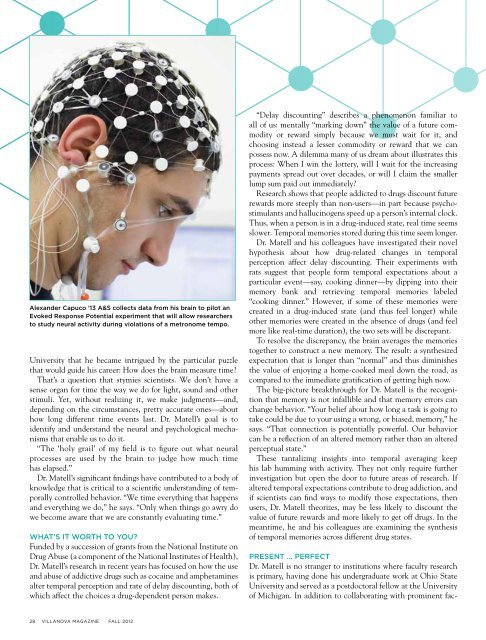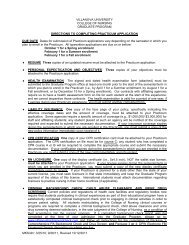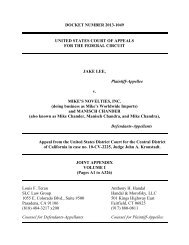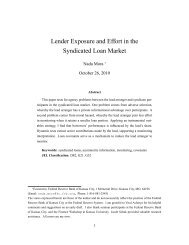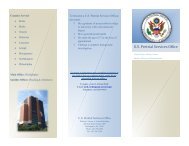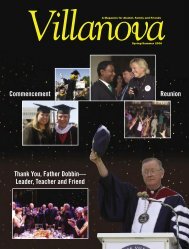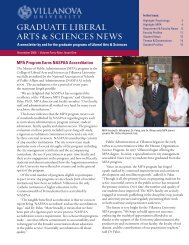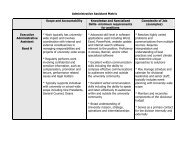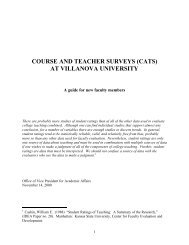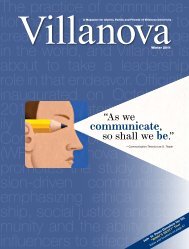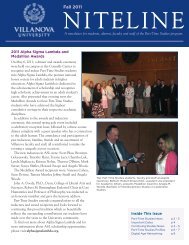Create successful ePaper yourself
Turn your PDF publications into a flip-book with our unique Google optimized e-Paper software.
Alexander Capuco ’13 A&S collects data from his brain to pilot anEvoked Response Potential experiment that will allow researchersto study neural activity during violations of a metronome tempo.<strong>University</strong> that he became intrigued by the particular puzzlethat would guide his career: How does the brain measure time?That’s a question that stymies scientists. We don’t have asense organ for time the way we do for light, sound and otherstimuli. Yet, without realizing it, we make judgments—and,depending on the circumstances, pretty accurate ones—abouthow long different time events last. Dr. Matell’s goal is toidentify and understand the neural and psychological mechanismsthat enable us to do it.“The ‘holy grail’ of my field is to figure out what neuralprocesses are used by the brain to judge how much timehas elapsed.”Dr. Matell’s significant findings have contributed to a body ofknowledge that is critical to a scientific understanding of temporallycontrolled behavior. “We time everything that happensand everything we do,” he says. “Only when things go awry dowe become aware that we are constantly evaluating time.”What’s it worth to you?Funded by a succession of grants from the National Institute onDrug Abuse (a component of the National Institutes of Health),Dr. Matell’s research in recent years has focused on how the useand abuse of addictive drugs such as cocaine and amphetaminesalter temporal perception and rate of delay discounting, both ofwhich affect the choices a drug-dependent person makes.“Delay discounting” describes a phenomenon familiar toall of us: mentally “marking down” the value of a future commodityor reward simply because we must wait for it, andchoosing instead a lesser commodity or reward that we canpossess now. A dilemma many of us dream about illustrates thisprocess: When I win the lottery, will I wait for the increasingpayments spread out over decades, or will I claim the smallerlump sum paid out immediately?Research shows that people addicted to drugs discount futurerewards more steeply than non-users—in part because psychostimulantsand hallucinogens speed up a person’s internal clock.Thus, when a person is in a drug-induced state, real time seemsslower. Temporal memories stored during this time seem longer.Dr. Matell and his colleagues have investigated their novelhypothesis about how drug-related changes in temporalperception affect delay discounting. Their experiments withrats suggest that people form temporal expectations about aparticular event—say, cooking dinner—by dipping into theirmemory bank and retrieving temporal memories labeled“cooking dinner.” However, if some of these memories werecreated in a drug-induced state (and thus feel longer) whileother memories were created in the absence of drugs (and feelmore like real-time duration), the two sets will be discrepant.To resolve the discrepancy, the brain averages the memoriestogether to construct a new memory. The result: a synthesizedexpectation that is longer than “normal” and thus diminishesthe value of enjoying a home-cooked meal down the road, ascompared to the immediate gratification of getting high now.The big-picture breakthrough for Dr. Matell is the recognitionthat memory is not infallible and that memory errors canchange behavior. “Your belief about how long a task is going totake could be due to your using a wrong, or biased, memory,” hesays. “That connection is potentially powerful. Our behaviorcan be a reflection of an altered memory rather than an alteredperceptual state.”These tantalizing insights into temporal averaging keephis lab humming with activity. They not only require furtherinvestigation but open the door to future areas of research. Ifaltered temporal expectations contribute to drug addiction, andif scientists can find ways to modify those expectations, thenusers, Dr. Matell theorizes, may be less likely to discount thevalue of future rewards and more likely to get off drugs. In themeantime, he and his colleagues are examining the synthesisof temporal memories across different drug states.Present … perfectDr. Matell is no stranger to institutions where faculty researchis primary, having done his undergraduate work at Ohio State<strong>University</strong> and served as a postdoctoral fellow at the <strong>University</strong>of Michigan. In addition to collaborating with prominent fac-28 <strong>Villanova</strong> MAGAZINe FALL <strong>2012</strong>


